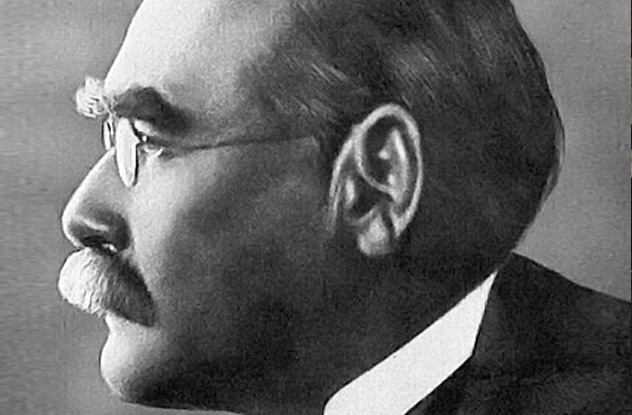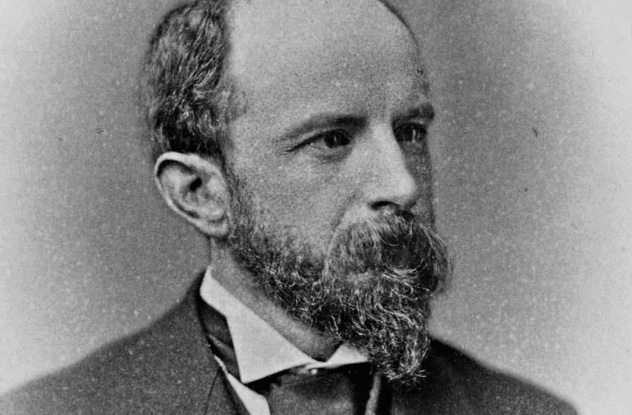 Weird Stuff
Weird Stuff  Weird Stuff
Weird Stuff  Mysteries
Mysteries 10 Tragic Disappearances and Deaths in Joshua Tree National Park
 History
History 10 Ways Childhood Really Sucked in the Old West
 Music
Music 10 Name Origins of Famous Bands from the 1990s
 Religion
Religion 10 Biggest Turnarounds by the Catholic Church
 Weird Stuff
Weird Stuff 10 Unbelievable Times Laws Had Unintended Consequences
 Humans
Humans Ten Historic Women Who Deserve Way More Credit Than They Got
 Movies and TV
Movies and TV 10 Films That Spawned Major Lawsuits
 History
History Ten Times Towns Were Wiped Off the Face of the Earth
 Creepy
Creepy 10 of the Most Disturbingly Haunted Public Houses in the UK
 Weird Stuff
Weird Stuff 10 Niche Subcultures That Are More Popular Than You Might Think
 Mysteries
Mysteries 10 Tragic Disappearances and Deaths in Joshua Tree National Park
 History
History 10 Ways Childhood Really Sucked in the Old West
Who's Behind Listverse?

Jamie Frater
Head Editor
Jamie founded Listverse due to an insatiable desire to share fascinating, obscure, and bizarre facts. He has been a guest speaker on numerous national radio and television stations and is a five time published author.
More About Us Music
Music 10 Name Origins of Famous Bands from the 1990s
 Religion
Religion 10 Biggest Turnarounds by the Catholic Church
 Weird Stuff
Weird Stuff 10 Unbelievable Times Laws Had Unintended Consequences
 Humans
Humans Ten Historic Women Who Deserve Way More Credit Than They Got
 Movies and TV
Movies and TV 10 Films That Spawned Major Lawsuits
 History
History Ten Times Towns Were Wiped Off the Face of the Earth
 Creepy
Creepy 10 of the Most Disturbingly Haunted Public Houses in the UK
10 Famous Quotes That Are Often Misinterpreted
People forget speeches but remember quotes. Quotations are so much easier to fit into slogans, bumper stickers, and memes. And by removing context, you can easily oversimplify messages and demonize opponents. Quotes can therefore communicate ideas radically different from a speaker’s original intention.
10“Do Not Let Your Left Hand Know What Your Right Hand Is Doing.”
Book Of Matthew

Matthew 6:3 is often held up as example of the Bible being full of nonsensical commands and advice. It was lampooned at length in a Peanuts comic strip, where Sally Brown’s left and right hands argue with each other while she tries to write something on a piece of paper. Christopher Hitchens’s best seller God is Not Great singled the verse out for its “pseudo-profundity.”
Actual meaning:
This is a simple matter of the quote becoming completely coherent if you just know the words in front of it. The full, intended message is: “But when you give to the needy, do not let your left hand know what your right hand is doing.”
The point is that you should not be boastful about or feel the need to draw attention to your charity. That might not be the deepest point to make, but it’s hardly the pseudo-profundity that Hitchens and others assert.
9“Slay The Idolaters Wherever You Find Them.”
Sura 9:5

This passage from the Quran is known as the “Sword Verse” (or the “Revelation of the Sword”). It is often used as evidence that Islam’s followers are borderline-genocidal fanatics and that the religion is fundamentally evil. There are people from inside the religion as well who misinterpret it, often extremists.
Actual meaning:
Islamic scholars have consistently said that the verse certainly does not call for constant holy war to wipe out non-believers. It refers to a specific time in the 600s when the faith was under military attack around its central holy place of Mecca. The verse is about fighting a defensive war. It is hardly the “kill or be killed” struggle that the language of that translation implies. The very next verse reads:
“If one among the Pagans ask thee for asylum, grant it to him, so that he may hear the word of Allah; and then escort him to where he can be secure. That is because they are men without knowledge.”
Other verses before and after it make it clear that even this defense must be handled with considerable restraint:
“If they cease, God is oft-forgiving, most merciful . . . and know that God is with those who restrain themselves.” (Sura 2:192–194)
8“East Is East And West Is West, And Never The Twain Shall Meet.”
Rudyard Kipling

This quote from Rudyard Kipling’s 1889 poem “The Ballad of East and West” is often used as a comment about incompatibility of differing cultures. It’s understandable that such an impression would develop. For a long time, the author of The Jungle Book, Kim, and other Victorian classics was thought a bigot. Recently, biographers like Andrew Lycett have argued that by the standards of his time, Kipling was actually fairly progressive during his time in India. Supposedly, only with age did he become more racist in his writing.
Actual meaning:
Rather than saying that people from different geopolitical locations are incompatible, the next line says:
“But there is neither East nor West, Border, nor Breed, nor Birth,
When two strong men stand face to face, though they come from the ends of the earth!”
Rather than a pessimistic and xenophobic sentiment, the famous quote is the exact opposite. The differences between Eastern and Western people become meaningless when we have maturity (or become “strong men”) enough to look past our superficial differences.
7“You Can See Russia From Alaska.”
Sarah Palin
In 2008, when the Republican Party nominated Sarah Palin as their vice presidential candidate, Americans seemed eager to see her insulted and parodied. One of the absurd sound bytes attributed to her—“You can see Russia from my house”—wasn’t a quote of hers at all. It written by Tina Fey for Saturday Night Live. However, this was only a slight exaggeration of what she’d actually said in an interview just days before, which was, “You can actually see Russia from land here in Alaska.” Either quote sounds like her vacuous attempt at claiming diplomatic insight into the country.
Actual meaning:
The interview took place in Alaska, and ABC interviewer Charles Gibson noted their proximity to Russia. He then asked Palin about Russia’s recent invasion of Abkhazia and South Ossetia, two disputed territories. Palin responded to his questions. She then reiterated the interviewer’s own observation that they were near Russia, adding the (true) fact that Russia is visible from parts of Alaska. Gibson asked what insight this gave her, and she directly denied that it gave her any. Instead, she was just pointing out that the world is small, so we have to work with other countries to maintain peace. That might sound banal, but it’s hardly crazy.
The full interview ran for more than a half hour and offered ample ammunition for any critic looking to question Palin’s knowledge or views. And yet the part that was best remembered was just the quote that seemed funniest when robbed of context.
6“The Simplest Explanation Is The Best”
William Of Ockham

The above quote paraphrases a line often attributed to 14th-century Franciscan monk William of Ockham. The line, dubbed “Occam’s Razor,” is “entia non sunt multiplicanda praeter necessitate,” or “entities must not be multiplied beyond necessity.” It’s a favorite reference point for atheists, including, again, Christopher Hitchens, who named his own related “Hitchens’s Razor” after it.
Actual meaning:
This use of Occam’s Razor to promote atheist ideologies is deeply ironic in that it goes completely against what William of Ockham had to say back in the day. The Stanford Encyclopedia of Philosophy has recently found that William actually wrote:
“Nothing ought to be posited without a reason given, unless it is self-evident or known by experience or proved by the authority of Sacred Scripture.”
Ockham’s thoughts about burden of proof may be sound. But if you want to argue against the existence of God, you probably shouldn’t appeal to the authority of someone who called holy writings equal in value to self-evident truths.
5“A Teacher Affects Eternity; He Can Never Tell Where His Influence Stops.”
Henry Adams

This quote from The Education of Henry Adams is often used an inspirational motto among educators. It may be a bit outdated in referring to teachers as “he” when 74 percent of teachers in some countries are female, but that does nothing to diminish its ongoing circulation. Little wonder, as the book is considered a classic autobiography, and the author was a great-grandson of president John Adams and a Harvard professor.
Actual meaning:
The original context of the quote is anything but inspirational. The wider book denounces the Harvard faculty for being uncaring if not clueless:
“If their new professor had asked what idea was in their minds, they must have replied that nothing at all was in their minds, since their professor had nothing in his.”
True, he says that it’s impossible to determine the stopping point for a teacher’s influence. But that’s hardly as positive as all those pro-teacher would have you believe. He’s actually comparing teachers to murderers:
“A murderer takes life, but his deed stops there.”
4“There Stands Jackson Like A Stone Wall!”
General Barnard Bee

This famous declaration from the American Civil War forever changed General Thomas Jackson’s name in the popular imagination to “Stonewall Jackson.” He was, if not Robert E. Lee or Nathan Forrest, the most famous general who fought for the Confederacy and certainly one of the most important.
During the Battle of Bull Run, the first major battle of the war, the Confederate army was about to be routed. But Jackson’s brigade of soldiers stood firm, letting the routed Southern troops rally behind him so they could counterattack and drive the Union army back. In winning the battle, Jackson’s “Stonewall” stand was key to dragging out the war for four years and killing hundreds of thousands of people.
Actual meaning:
Though the brigade let the Southern army rally and drove the Northerners back, when Bee yelled that, Jackson’s soldiers hadn’t fired a shot yet. They had been standing behind Bee’s brigade like a stone wall.
Bee’s words weren’t praise for Jackson. They were insulting him for standing idle.
During the course of the battle, Bee was mortally wounded. On his death bed, Bee continued raging against Jackson for not supporting him until after his troops had been routed. So whenever Jackson’s admirers called him “Stonewall” or placed the name on a memorial statue, they may as well have been calling him “Do Nothing.”
3“Religion Is The Opium Of The Masses.”
Karl Marx

This phrase (also often translated as “opiate of the masses” or “opium of the people) is Marx’s condemnation of religion, published in 1844 in his paper “Critique of Hegel’s Philosophy of Right.” The common interpretation suggests that religion holds the poor down by depriving them of money or filling them with irrelevant thoughts. Whenever a new habit emerges that society wants to condemn (television, social media, etc.), someone is likely to call it the new opium of the people.
Actual meaning:
When Marx expressed this, opium was the only analgesic a poor person was likely to have access to. As people like Kurt Vonnegut have noted, the line didn’t just say “religion is ruining the lives of the poor and keeping them complacent and desperate.” It said instead that religion relieves people’s pain. Religion doesn’t make people’s lives objectively worse. It makes their lives bearable.
Marx argued that the abolition of religion will remove people’s happiness—their illusory happiness. Without religion, people could be driven to address and improve their actual condition in life.
2“I’ve Been On Food Stamps And Welfare. Anybody Help Me Out? No.”
Craig T. Nelson
This 2009 quote comes from actor Craig T. Nelson on Fox’s Glenn Beck Program. It’s often used as evidence that Nelson (and, by extension, all people like him) are hypocrites in their attitude toward state assistance. Such people claim to be responsible for their own wealth, according to comedians and commentators, but they actually depend on others. It can be demonstrated that everyone depends on others—especially Nelson, who accepted government assistance through food stamps but seems to deny other people the same privilege.
Actual meaning:
The line itself is humorously contradictory, and Nelson probably would have stated it differently, given the chance. But if you look at the context, a very different meaning emerges. Here is what Nelson said just beforehand:
“They should be allowed to go bankrupt! What happened—we are a capitalistic society. Okay, I go into business, I don’t make it, I go bankrupt. They’re not going to bail me out.”
Nelson wasn’t railing against a general social safety net. He was just opposing business bailouts. Many others in the country, including those who criticized Nelson and call for greater government assistance, are similarly unsympathetic to companies and banks bailed out by the government.
He was arguing that failed businessmen should lose their investments, which doesn’t mean people must be denied essentials such as those provided by welfare and food stamps. Indeed, earlier in the interview, he called for funding education, veterans’ benefits, and civil services, arguing that the government should spend money to protect citizens.
1“Facts Are Stupid Things.”
Ronald Reagan
People often use this quote to show how stupid and senile Reagan was during the end of his presidency. The mistake occurred On August 18, 1988 while he was speaking at the Republican National Convention. On its own, it’s a meaningless and indefensible statement.
Actual meaning:
Reagan was misquoting John Adams’s famous line that “facts are stubborn things,” from Adams’s defense of the British soldiers after the Boston Massacre. Reagan was not too dense to pick up on the error. Nor was it a Freudian slip that indicated he hated reality. He immediately corrected himself, and an audience of supporters laughed.
Such slips of the tongue that get instantly corrected do not reflect party allegiances or intellect, as anyone who remembers Barack Obama’s 57 states flub is aware. If it didn’t fit in with the image of Reagan as being unfit to serve as president, it would be no more remembered than the rest of the speech.
Dustin Koski is also featured in Listverse’s Astounding Bathroom Reader. He hopes that someday something he wrote in there will be famously misunderstood.








